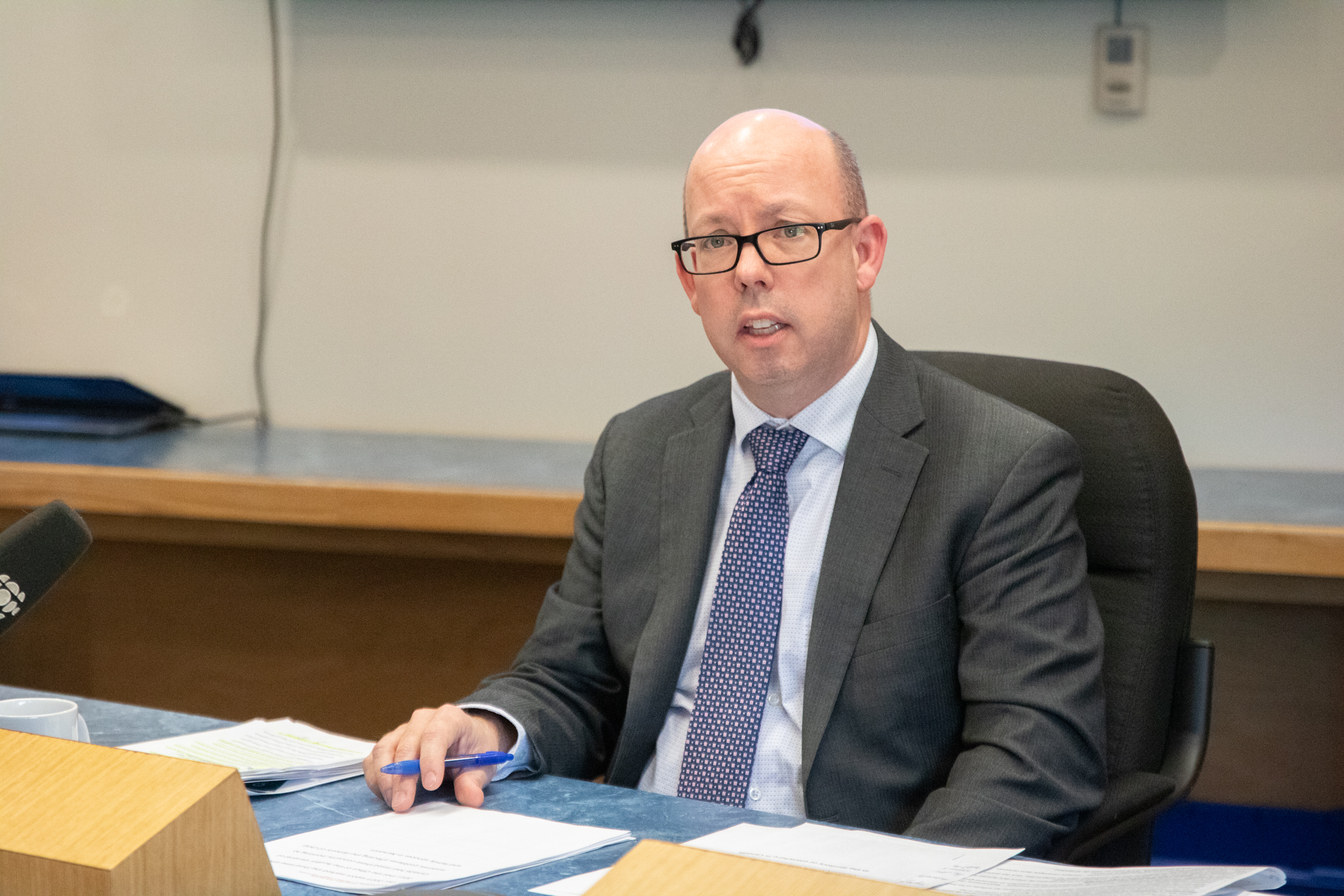The auditor general is coming to look at Nunavut’s public housing. What does this mean?
Report to be tabled Monday at the legislative assembly
Deputy auditor general Andrew Hayes will be in Iqaluit on May 26 for the tabling of his office’s report on Nunavut Housing Corp.’s delivery and maintenance of public housing. (File photo by Jeff Pelletier)
The Office of the Auditor General of Canada is no stranger to Nunavut.
The auditor general has been working with the Nunavut government since 2011 to better protect the well-being of vulnerable children in its care. Most recently, Andrew Hayes, the deputy auditor general, made a trip to Iqaluit in early March to present a followup report on this issue.
His assessment: More work needs to be done.
Now, the federal auditor general is planning a trip to Iqaluit to share findings of another audit, this one into Nunavut Housing Corp.’s delivery of public housing across the territory. That’s scheduled to happen on May 26.
Here is what you need to know about the upcoming audit into public housing and the work of the auditor general’s office.
Why is housing audited?
The purpose of this audit is to determine whether Nunavut Housing Corp. provides Nunavummiut with “equitable access to suitable public housing” and manages the “adequacy of its public housing inventory,” according to an auditor general’s media advisory on the upcoming report.
This will be the second audit in Nunavut Housing Corp.’s history, and it will come as the corporation is working on its $2.6-billion goal to build 3,000 units in Nunavut by 2030. The government announced Nunavut 3000 in October 2022.
At the time of the first report in 2008, Nunavut Housing Corp. was in the middle of a different major house-building project — the $200-million Nunavut Housing Trust, which delivered 725 new housing units between 2006 and 2010.
“We are concerned that, given the increasing number of housing units to be built over the coming years, the [Nunavut Housing Corp.] will continue to find it difficult to meet the goals set out in the Nunavut Housing Trust Delivery Strategy,” the auditor general’s report said in 2008.
It noted the corporation “does not ensure that the public housing program is delivered in compliance with its policies.”
In the end, the housing corporation ended up overspending $60 million on the project.
Who is the auditor general anyway?
The Auditor General of Canada is appointed by the Governor General, with approval from both the Senate and the House of Commons, for a 10-year term. Current auditor general Karen Hogan was appointed in June 2020.
Hogan’s office provides “objective, fact-based information and expert advice” on government programs, the Auditor General of Canada website says.
Why is Nunavut audited by a federal body?
All Canadian provinces have their own auditors general, but not the territories.
Nunavut, Yukon and Northwest Territories fall under the jurisdiction of the federal office.
The federal auditor general has presented 22 reports to the Nunavut legislative assembly since 2001, including reports on education, health care, family services, housing, climate change, correctional facilities and delivery of COVID-19 vaccines.
The Nunavut government has been audited, so what?
The auditor general’s recommendations are not legally binding — the office doesn’t have legal tools to enforce its recommendations, and that’s not part of its mandate.
For instance, in 2023, Hogan called her report into Nunavut’s Family Services “an urgent call for action.”
Yet, when presenting a followup to Hogan’s report two years later, Hayes said the Department of Family Services is “yet to produce appreciable changes to outcomes for vulnerable children and youth.”
The role of the auditor general is to help “hold the federal government to account for its handling of public funds,” its website says.







Probably means those who really need a unit gets it, rather a family friend of the board(s).
It means…..now we will finally see the numbers since the creation of Nunavut….how much tax payer pay in repairs to all the holes in the walls across Nunavut cost us!! $650 million dollars.
Just going to be another scathing report for the GN to turn their heads away.
For 84 years, the Nunavut Leader has maintained power, raising concerns about accountability and transparency, similar to past issues at QIA. Typically, a leader would have been removed by now, but this leader is expected to remain in power for at least four more months. This government has shown a consistent reluctance to answer questions, with the leader often diverting attention to minor accomplishments. The former Minister of Finance seems to strongly support the current government, frequently praising their efforts while expressing distrust towards the previous government. Hopefully, the advertisements that have become an eyesore will soon end. Meanwhile, the NHC minister’s absence raises concerns. This is the most corrupted government in history. Time to turn the page once and for all, enough of this NON OF IT!
what? that this place is one large welfare state paid for by the canadian taxpayer? where people complain about what they dont have but take no responsibility for themselves? i’m sure he would say that.
1. Ensure that your maintenance staff has clear criminal records, as they will be entering tenants’ homes. This applies to both full-time and casual staff.
2. Make sure your Foreman has the experience to fill in for maintenance staff when needed, as failing to do so may lead to the maintainers becoming overly exhausted.
3. Ensure that the Tenant Relations Officer (TRO) and the Foreman conduct annual home visits to confirm that tenants are adhering to their tenancy agreements by maintaining cleanliness in their units. Many tenants do not request work orders from housing when issues arise. Tenant Relations Officers should also provide education, alongside the Foreman, on how to use heating and ventilation systems properly to prevent mold in the units.